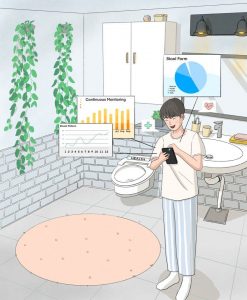What If a Smart Toilet Leaks Our Innermost Secrets?

Scientists and doctors have long been aware that our daily waste offers valuable insights into our health and well-being. But for most people, going to the bathroom is a part of their daily routine that they’d prefer to quickly flush away. Luckily, a new batch of “smart toilets” is hitting the market, offering analysis to the most squeamish of consumers. But in a world of seemingly constant data leaks and internet scams, how ethical are these brilliant bowls? And what risks are users assuming with each deposit?
The smart toilet is by no means a new idea, but in recent years, Stanford Medicine Department of Urology instructor Dr. Seung-min Park has begun contemplating the ethical concerns we may face once feces and urine scanning devices become commonplace, as the university’s Scope Blog reports.
“There’s an increase in privacy issues, an increase in ethical consideration of how AI-related devices are monitoring you,” Park tells LAMag. “That was a huge motivation [to] start thinking about how to use this system ethically, paying attention to privacy protection.”
Also a senior research scientist and bioengineer at Stanford, Park joined the smart toilet team several years ago when it was still led by the late Dr. Sanjib Sam Gambhir. Initially hired to work on nanotechnology, a desire to reorientate his focus at Stanford led Park to begin working to expedite the smart toilet’s arrival.
Kanarai AI, which Park co-founded, showcases the device as a seat add-on to existing toilets—sparing users from having to purchase an entirely new setup.

Kanaria AI and IZEN
“We want to use the existing infrastructure [and] add a little bit on to that,” Park says, clarifying that the product should be easy to install. “The only thing you have to do is remove your toilet seat.”
Once installed, the device begins to scan the inner bowl and upload images to the cloud, offering a glimpse into the inner workings of our bodies and our lavatory habits. Too much fiber and not enough water? Maybe that explains constipation. Is your excrement black? That could be a sign of bleeding along the gastrointestinal tract. The device can even detect irritable bowel syndrome, track responses to chemotherapy, and collect data on how often we have soft stools or how long we sit.
“Our system is more likely to be [just visual] screening for now,” Park said. “But eventually it will be both a medical device that can do diagnostics such as [for] Covid-19.”
Whatever it may detect, keeping an artificial eye on our daily movements assures us one additional resource to maintain our health.
Still, among the vast amounts of our data being collected daily, Park says he’s worried about what happens when a smart toilet leaks what is essentially medical information.
Besides hackers having access to data about the illnesses we may have, one notable concern Park mentioned, especially since the recent overturning of Roe v. Wade, is the ability of the device to detect pregnancy, or vice-versa, potentially endangering those who seek an abortion in certain states or countries.
“We have to make sure that it’s under HIPAA,” Park says. “That information falls under those kinds of protection, so you cannot leak it.”
The device could also detect the drug use of anyone who uses it, he said.
Beyond private use, Park sees vast potential for the device in medical settings and has also begun working with the Stanford Center at the Incheon Global Campus in South Korea to develop “smart cities” which would incorporate the devices.
By using some sort of a two-factor identification system, such as phone connectivity or a fingerprint flusher, people can log into their smart toilet accounts to track their usage no matter where they go.
“The thing about a smart toilet, though, is that, unlike wearables, you can’t take it off,” Gambhir told Stanford’s Scope in 2020. “Everyone uses the bathroom—there’s really no avoiding it—and that enhances its value as a disease-detecting device.”
Park also mentioned he’s currently working with NASA to develop the device for spaceflight. With all the harmful radiation in space, it’ll be important to keep up with the biomes of the astronauts in a non-invasive manner.
“[For the] more advanced version of this modular system… we can analyze the microbiome, because [it’s] related to your immune system,” he said. “That’s a really important factor.”
At the end of the day, however, the biggest immediate benefit the device will provide may be its ability to learn from our feces more pleasantly and accurately—without having to analyze it ourselves.
Stay on top of the latest in L.A. news, food, and culture. Sign up for our newsletters today



